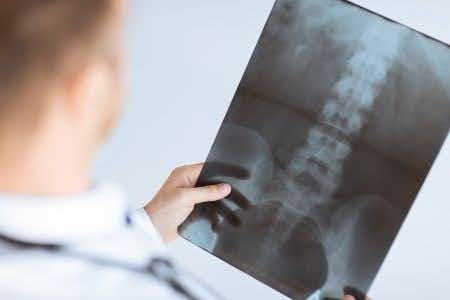A spinal orthopedic surgery expert witness on advises on a case involving a forty-five year old male patient who underwent cervical fusion surgery. The patient from Rhode Island was discharged shortly following the procedure but later returned to the ER in a deteriorated mental state, with signs of sepsis and drainage from the surgical site. The patient was admitted to the ICU. A CT scan of the cervical spine did not reveal evidence of an abscess or spinal cord compression, however did not rule out compression or abscess at another level of the spine and did not explain the patient’s symptoms. Six days after initial presentation the patient developed bilateral lower extremity paraplegia. The treating surgeon was notified but did not order any emergency investigations or imaging. Later that day an MRI of the cervical spine was ordered as a non-emergency. Upon review of the cervical spine there were no signs of any abscesses. Three hours later an MRI of the thoracic and lumbar spine was conducted which revealed an epidural spinal abscess and cord compression. The patient was taken to the OR for debridement and irrigation and cord decompression. The remainder of the patient’s admission was complex and he never regained motor function in either lower extremity. He was discharged two weeks later.
Question(s) For Expert Witness
1. Do you have experience treating spinal cord compression, resulting from epidural abscesses? If so, how often?
2. Should an MRI of the entire spine have been ordered when the patient initially presented?
Expert Witness Response E-001355
I am a board certified, Fellowship trained Spine Surgeon and have been practicing for nearly a decade. I currently serve as an Assistant Professor in the Departments of Neurological Surgery and Orthopaedic Surgery at a major medical university. I treat patients with spinal infections, epidural abscess and spinal cord injuries on a regular basis. In a given year, I estimate that I have to decompress the spinal cord for an epidural abscess between 10-30 times. I estimate that I treat 2-3 times that many patients/year with spinal infections, but most do not require surgery. With the clinical scenario presented to me, I would have ordered a cervical MRI especially with a draining surgical wound. If the cervical MRI was negative for infection, and another obvious source of infection had not been determined for the patient's symptoms, I would have ordered a thoracic/lumbar MRI.
About the author
Dr. Faiza Jibril
Dr. Faiza Jibril has extensive clinical experience ranging from primary care in the United Kingdom, to pediatrics and child abuse prevention at Mount Sinai Hospital, to obstetrics in Cape Town, South Africa. Her post-graduate education centered on clinical research and medical ethics. Dr. Jibril is currently Head of Sales in the US and Canada for Chambers and Partners - a world leading legal ranking and insights intelligence company.



